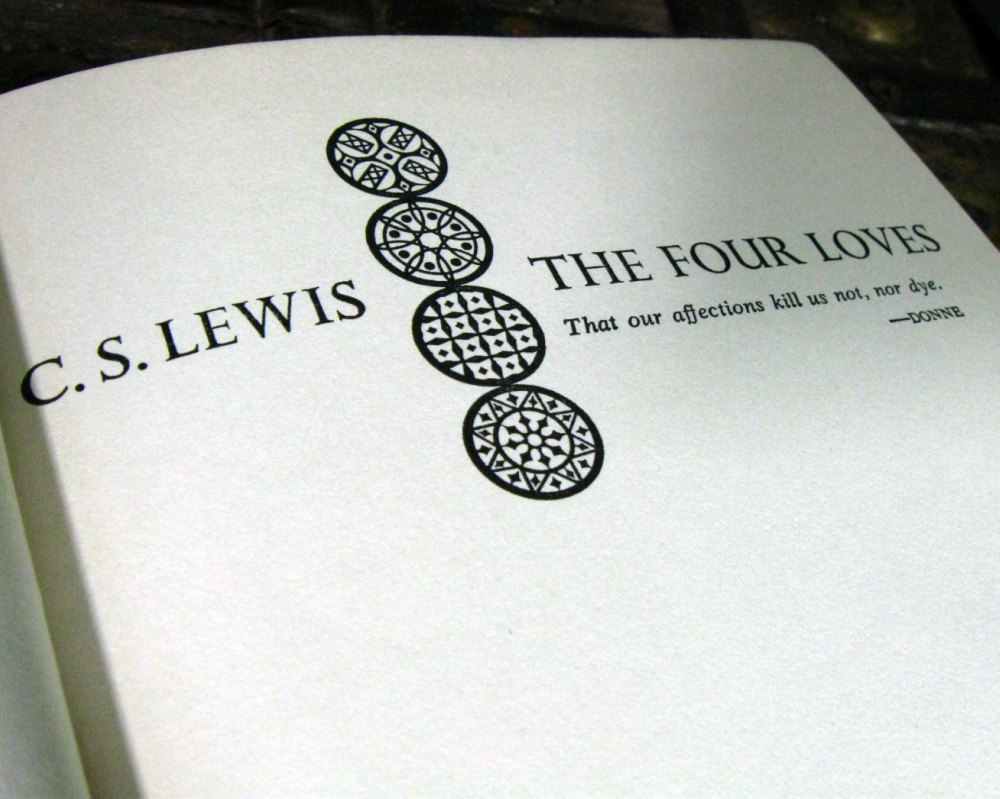In my previous post about the class I’m teaching on C. S. Lewis’s The Four Loves, I explained the background of the book, how it began as radio broadcasts that were then expanded and transformed into the book.
Lewis’s first chapter—the Introduction—lays the groundwork for all that follows. He begins by making a distinction between gift-loves and need-loves. A gift-love, Lewis says, is the kind that moves people to do things for others even when they don’t receive anything in return. It is essentially unselfish—the word often used for this is “altruistic”—and ultimately mirrors the kind of love that we all should aim for.
The other kind—a need-love—comes about when we feel a certain need for something and desire it. One easy example is the love that sends a lonely or frightened child to its mother’s arms. While it’s not altruistic, Lewis notes that it still is a kind of love. In fact, he notes that he had to readjust his thinking as he prepared to write about love.
Yes, that need-love can become a problem if it takes over our lives. Yet he offers a caution about being too contemptuous of those needs.
We have to keep in mind, Lewis advises, that our love for God is a real need-love. That is obvious, he notes, “when we implore forgiveness for our sins or support in our tribulations.” We are a needy people, constantly in need of forgiveness and cleansing. Crying out to God in our need is not only fine, but absolutely required if we want to develop in our Christian life. It should not be discouraged or detested at all.
Near the end of the Introduction, Lewis strikes a theme that is going to continue throughout the chapters on affection, friendship, and eros. We have a tendency to make one of those loves so important that it can displace God. He puts it this way:
“This balance,” Lewis counsels, “seems to me an indispensable safeguard. If we ignore it, the truth that God is love may slyly come to mean for us the converse, that love is God.” And that’s when we find ourselves placing one of those human loves on a pedestal, making it into a god of its own. Lewis summarizes thusly:
We may give our human loves the unconditional allegiance which we owe only to God. Then they become gods: then they become demons. Then they will destroy us, and also destroy themselves. For natural loves that are allowed to become gods do not remain loves. They are still called so, but can become in fact complicated forms of hatred.
How can affection become a demon/false god? In what way might friendship go wrong and be elevated to that status? How often (well, quite often) do we see eros/romantic love take precedence over everything else?
As Lewis moves into those chapters and discusses those natural loves, he shows clearly how they are meant to be blessings because they are good—yet how all too often we distort them and use them to replace the charity he describes in the final chapter. Charity is God’s love, and it must tame the other types in order for them to be what God intended.
Before Lewis addresses the first natural human love—affection—he draws attention to how we might also substitute some sub-human likings/loves for the real thing. That’s where I’ll go in the next post.





